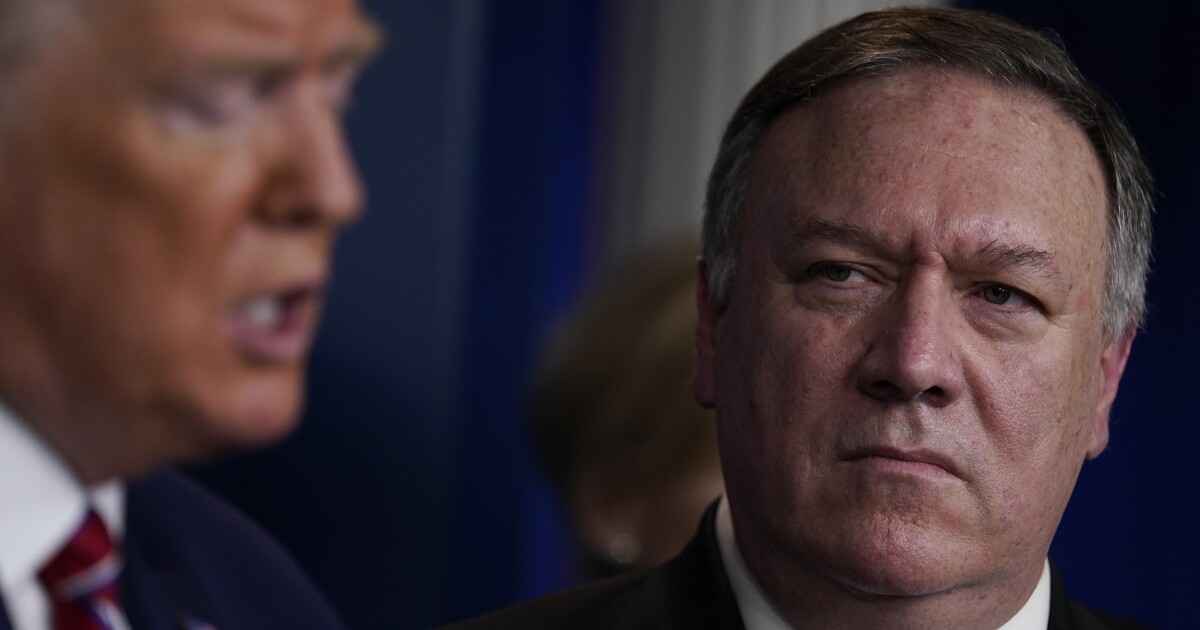

Mike Pompeo did something this month many prominent Republicans in his position stubbornly refused to do. Publicly, without arm-twisting, the former secretary of state leaned into his desire to run for president in 2024.
If you’ve followed Pompeo or the dozen or so other Republicans like him interested in a White House bid, you’ve noticed they tend to downplay their plans for higher office every chance they get. “My priority is to help Republicans win control of Congress in 2022,” they insist, all while making the rounds in Iowa, New Hampshire, and South Carolina and then making the rounds again — and again and again.
Or, they do what Sen. Ted Cruz (R-TX) did recently in an interview with the Washington Examiner: They argue there’s no point in discussing the 2024 GOP presidential primary until former President Donald Trump makes his intentions to run or not public. “The whole world will change depending on what Donald Trump decides,” Cruz said this month during a campaign swing through New Hampshire.
So, Pompeo turned some heads when he revealed, rather bluntly, during an appearance at a charity gala in Chicago to benefit the Navy SEAL Foundation that he’s preparing to launch a campaign and has teams in Iowa, New Hampshire, and South Carolina, the crucial early primary states that vote first, second, and third, respectively, in the quadrennial GOP nominating contest.
“We’ve got a team in Iowa, a team in New Hampshire and South Carolina,” said Pompeo, who in interviews is efficient with his words and deliberate about what he chooses to say. “And that’s not random. We are doing the things one would do to get ready.”
Top Pompeo adviser Brett O’Donnell was tight-lipped about who constitutes Team Pompeo in the big three early primary states when I inquired this week.
But some calls to Iowa and New Hampshire netted both information and a more accurate picture of the breadth, or lack thereof, of the teams aiding the former secretary of state. And in both politically important states, it appears the teams are one man deep, each — sherpas, essentially, who are helping him organize events and conduct outreach to influential activists, state lawmakers, and party bigwigs.
In Iowa, Pompeo’s sherpa is Tyler Campbell, who operates out of his own Des Moines-based firm, FIN Strategies (FIN as in “first in the nation”). Republican sources say he has ties to LS2 Group, a big Iowa firm that mostly advises Republicans. In New Hampshire, Pompeo’s sherpa is Matthew Bartlett, principal of the firm Darby Field Advisors. Both Campbell and Bartlett have extensive consulting experience in their home states, although neither is necessarily a household name among political insiders.
Meanwhile, Pompeo’s South Carolina team, such that it is or isn’t, is something of a mystery.
Calls to a handful of veteran Republican operatives in the Palmetto State, the sort who traffic in information, netted zero intel on who, exactly, is running point for Pompeo. Matt Moore, former chairman of the South Carolina GOP, planned a single Pompeo event back in 2021, but that was a one-time thing. It’s possible whoever is helping Pompeo is being extra quiet out of respect for Sen. Tim Scott (R-SC) and former Gov. Nikki Haley, who served as U.S. ambassador to the United Nations under Trump.
Both Haley and Scott are eyeing a possible 2024 campaign and, as one Republican consultant in the state noted, “all of the top South Carolina operatives are giving deference to Nikki and Tim.” Asked via text for help solving the mystery Wednesday, O’Donnell answered with a simple “no comment.”
Pompeo is an intriguing presidential prospect. However, polling gauging support for the Republican Party’s possible 2024 contenders is lately dominated by Trump and Florida Gov. Ron DeSantis.
Still, the former secretary of state, who served as a Kansas congressman before joining the Trump administration, possesses undervalued skill as a retail politician and has spent the last half-dozen years in Washington courting GOP power players, grassroots activists, and donors.
Pompeo would be worth watching, should he run.
Now, to the field …
Battle for the Senate: In the competitive fight for Senate control in the midterm elections, Sen. Rick Scott (R-FL), chairman of the National Republican Senatorial Committee, has laid down a marker. Republicans, he told donors over the weekend in a memorandum, will pick up two seats in November, at least, and enter the 118th Congress with a minimum of 52 seats.
Expressing unbridled optimism is hardly unusual from party leaders just weeks before a big election. It helps raise resources, motivates grassroots volunteers to work overtime getting out the vote, and encourages strong turnout by those voters who can make the difference between a party’s candidates winning and losing tough races. But those same party leaders are typically hesitant to make specific predictions about exactly how many seats they expect to win.
In this way, Scott’s comments stand out. Here’s what the NRSC chairman said, per the memo, flagged by Axios’s Hans Nichols: “We are less than 60 days from the election and our path to winning back the Senate majority is clear. We are on track to winning a minimum of 52 seats — and we are fighting every day to get to 54 or more.”
Meanwhile, Senate Majority Leader Chuck Schumer (D-NY) recently gave Democrats a 60% chance of retaining control of the chamber despite a very challenging political environment for his party. The Senate, evenly divided at 50-50, currently belongs to the Democrats courtesy of Vice President Kamala Harris’s tiebreaking vote.
Iowa Senate race. The Democratic Party’s chances of ousting Sen. Chuck Grassley (R-IA) this fall appear headed from slim to none, to borrow a rather apt cliche.
Grassley, 89, a fixture in Congress since 1975 and in the Senate since 1981, was already cruising to an eighth term in Iowa, a Midwestern battleground behaving much more like a red state than a swing state in recent years. But the door on Democratic challenger Mike Franken’s campaign might be closing, and permanently, after revelations he allegedly sexually assaulted a female campaign staffer.
Franken, a retired Navy admiral, has been running a spirited, if uphill, bid to unseat Grassley. But this week, the Iowa Field Report uncovered an incident report filed with the Des Moines Police Department in which former Franken campaign manager Kimberley Strope-Boggus alleges he “grabbed the collar of the vest she was wearing and kissed her on her mouth” before she was able to “pull away.”
The Franken campaign was defiant, announcing a new television advertisement soon after the news broke featuring self-described former Grassley voters who are planning to support the retired admiral on Nov. 8. But with the NRSC already using Franken to pressure Senate Democrats who previously donated to the Iowa politician, it’s unclear that his campaign will make it that far.
“Which Democrat Senator contributed to Franken’s campaign?” the NRSC said in a press release. “D.C. Darling’s Mark Kelly of course.” Sen. Mark Kelly (D-AZ) is embroiled in a close race for reelection in Arizona.
2024 watch. It’s far too early for hypothetical 2024 matchups to matter all that much.
But a fresh poll of Florida voters, conducted for USA Today by Suffolk University, is sure to catch the eye of Republicans gaming out their party’s next presidential primary. The news from the survey is that DeSantis topped Trump among GOP voters in Florida — and it wasn’t particularly close. The governor led the former president by 8 percentage points, 48% to 40%, after trailing him 47% to 40% in a poll conducted by Suffolk back in January.
Now, there are a few important caveats here: 1. The margin of error in this poll is rather large — plus or minus 7.4 points. 2. Neither DeSantis nor Trump is a candidate (yet). Indeed, the governor is in the middle of a reelection campaign and blanketing Florida with favorable advertising. 3. Even if the poll is dead-on and both DeSantis and Trump run for president in 2024, the decision made by Republican voters in Florida will not be influenced by how the candidates perform in Iowa, New Hampshire, South Carolina, and Nevada.
Having said all that, guess who probably paid close attention to this latest Suffolk survey? You guessed it: Trump.







